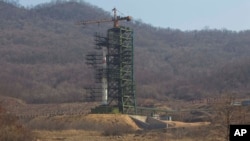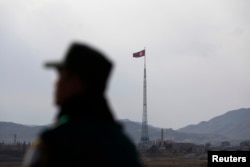North Korea has declared a no-sail zone off its eastern coast, raising concerns about another missile test, according to South Korean military officials.
The no-sail zone, which covers an area near the eastern coastal city of Wonsan, is effective from November 11 to December 7, the officials said this week. Reports say the order was first circulated through North Korea's internal communication channels.
North Korea does not appear to have notified international organizations of the move. In an email to VOA on Monday, the U.N.’s International Maritime Organization said it has not received any notification from North Korea regarding a no sail declaration.
But Jeon Ha-gyu, a spokesperson for South Korea’s Joint Chiefs of Staff, told reporters Monday the military will prepare a readiness posture if necessary.
Analysts in Seoul say Pyongyang could launch a mid-range missile or a new type of ballistic missile considering the extent of coverage.
“The no-sail zone is quite expansive and I believe that is because Pyongyang intends to fire a Rodong missile,” said Shin In-kyun, a defense analyst, in reference to North Korea's mid-range missile with a range of 1,300 kilometers.
Citing a government source, some South Korean media speculated that North Korea might fire a submarine launch ballistic missile. In May, Pyongyang claimed it had successfully test fired a submarine launched ballistic missile.
Jeon said the military is closely monitoring activities related to a possible launch.
But a South Korean official who asked to remain anonymous told VOA the communist country declared no sail zones multiple times over the past few months, but did not follow with a missile launch.
The North Korean move comes amid news reports that U.N. Secretary-General Ban Ki-moon plans to travel to Pyongyang this week. Citing a high-level U.N. source, South Korea’s Yonhap news agency said Ban is likely to meet with Kim Jong Un. But the report has not yet been confirmed by the U.N..
Lee Yeon Cheol and Jee Abbey Lee contributed to this report, which was produced in collaboration with the VOA Korean service.





